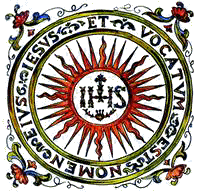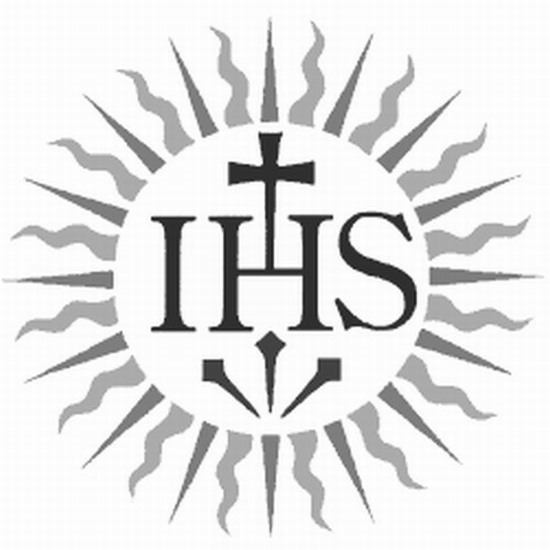|
|
Luke 2:21 "...Et vocatum est Nomen eius IESUS"
("And His Name was called JESUS")
Psalm 90:14 "Because he hoped in me I will deliver him:
I will protect him because he hath known My Name."
Zacharias 10:12 "I will strengthen them in the Lord,
and they shall walk in His Name, saith the Lord."
Apocalypse 3:8 "I know thy works. Behold, I have given before thee a door opened, which no man can shut: because thou hast a little strength, and hast kept my word, and hast not denied My Name."
Apocalypse 15:4 "Who shall not fear Thee, O Lord, and magnify Thy Name?..."
Throughout Sacred Scripture, God Himself names those who have a great role to play in our salvation. As recorded in the fifth chapter of Genesis, He named the first man Adam, which means "Man of the Earth", 1 and He changed the name of our spiritual Father from Abram to "Abraham," which means "Father of Many Nations," and changed that of Abraham's wife, Sarai, to "Sarah," which means "Princess" and foretells that she would be the spiritual mother to kings (Genesis 17). Our first Pope had been named "Simon" before he became "Peter" to signify his status as the earthly rock of the Church as Christ is the Foundation and Head. And so, too, the Name "Jesus" has meaning: His Holy Name means "God Saves" ("Emmanuel"), and that Our Lord would receive this Name was foretold by the divinely inspired Prophet Isaias: Isaias 7:14-15
Therefore the Lord himself shall give you a sign. Behold a virgin shall conceive, and bear a son, and his name shall be called Emmanuel. He shall eat butter and honey, that he may know to refuse the evil, and to choose the good.
Our Lady learned how she was to name her Child from the Archangel Gabriel: Luke 1:26-33
And in the sixth month, the angel Gabriel was sent from God into a city of Galilee, called Nazareth, To a virgin espoused to a man whose name was Joseph, of the house of David; and the virgin's name was Mary. And the angel being come in, said unto her: Hail, full of grace, the Lord is with thee: blessed art thou among women. Who having heard, was troubled at his saying, and thought with herself what manner of salutation this should be. And the angel said to her: Fear not, Mary, for thou hast found grace with God. Behold thou shalt conceive in thy womb, and shalt bring forth a son; and thou shalt call his name Jesus. He shall be great, and shall be called the Son of the most High; and the Lord God shall give unto him the throne of David his father; and he shall reign in the house of Jacob for ever. And of his kingdom there shall be no end.
... and St. Joseph heard it from an angel in a dream: Matthew 1:18-25
Now the generation of Christ was in this wise. When as his mother Mary was espoused to Joseph, before they came together, she was found with child, of the Holy Ghost. Whereupon Joseph her husband, being a just man, and not willing publicly to expose her, was minded to put her away privately. But while he thought on these things, behold the angel of the Lord appeared to him in his sleep, saying: Joseph, son of David, fear not to take unto thee Mary thy wife, for that which is conceived in her, is of the Holy Ghost. And she shall bring forth a son: and thou shalt call his name JESUS. For he shall save his people from their sins. Now all this was done that it might be fulfilled which the Lord spoke by the prophet, saying: Behold a virgin shall be with child, and bring forth a son, and they shall call his name Emmanuel, which being interpreted is, God with us. And Joseph rising up from sleep, did as the angel of the Lord had commanded him, and took unto him his wife. And he knew her not till she brought forth her firstborn son: and he called his name JESUS.
Then, when He was circumcised on the 8th day after His Nativity, He received the Holy Name: Luke 2:21
And after eight days were accomplished, that the child should be circumcised, his name was called JESUS, which was called by the angel, before he was conceived in the womb.
And what of it? St. Peter sums it up after he healed the lame man and was then asked by the high priest, "By what power, or by what name, have you done this?": Acts 4:8-12
Then Peter, filled with the Holy Ghost, said to them: Ye princes of the people, and ancients, hear: If we this day are examined concerning the good deed done to the infirm man, by what means he hath been made whole: Be it known to you all, and to all the people of Israel, that by the Name of our Lord Jesus Christ of Nazareth, whom you crucified, whom God hath raised from the dead, even by him this man standeth here before you whole. This is the stone which was rejected by you the builders, which is become the head of the corner. Neither is there salvation in any other. For there is no other Name under heaven given to men, whereby we must be saved.
When we say the Name "Jesus" (or "Iesus," "Iesu," "Yeshua," etc.) consciously, with deep reverence, we are re-realizing the core Truth of the holy Faith: "God Saves" -- and all gratitude and humility are summoned. Say that Holy Name, ponder it, feel it in your mouth and in your heart! "IESUS -- GOD SAVES!" When you pronounce it, know its meaning and humble yourself before it; feel in your heart how you are addressing and referring to Lord Christ. "IESUS -- SAVIOR!"
So holy is His Name that uttering it piously is an indulgenced act. So revered is it that:
This Catholic attitude of deep respect toward the Holy Name is exactly as it should be according to Sacred Scripture: Philippians 2:8-10
He humbled himself, becoming obedient unto death, even to the death of the cross. For which cause God also hath exalted him, and hath given him a name which is above all names: That in the Name of Jesus every knee should bow, of those that are in heaven, on earth, and under the earth:
It is "in His Name" that the Gentiles shall hope (Matthew 12:21); "in the Name of Jesus Christ" that the Apostles baptized (Acts 2:38), healed (Acts 3:6, 16), cast out demons (Acts 16:18), preached (Acts 9:27), and anointed (James 5:14); it is "by the Name" of Jesus that signs and wonders were seen (Acts 4:30).
And it is in His Name that we should place our faith, do our works, and say our prayers: I John 3:23
And this is his commandment, that we should believe in the Name of his Son Jesus Christ: and love one another, as He hath given commandment unto us.
Colossians 3:17
All whatsoever you do in word or in work, do all in the Name of the Lord Jesus Christ, giving thanks to God and the Father by Him.
John 16:23-24
...Amen, amen I say to you: if you ask the Father any thing in My Name, He will give it you. Hitherto you have not asked any thing in My Name. Ask, and you shall receive; that your joy may be full.
Formalized devotion to the Holy Name is the fruit of the work of St. Bernardine of Siena, A.D. 1380-1444, the Franciscan who reformed his Order and preached fiery sermons all over Italy. An excerpt from one: When a fire is lit to clear a field, it burns off all the dry and useless weeds and thorns. When the sun rises and darkness is dispelled, robbers, night-prowlers and burglars hide away. So when Paul's voice was raised to preach the Gospel to the nations, like a great clap of thunder in the sky, his preaching was a blazing fire carrying all before it. It was the sun rising in full glory. Infidelity was consumed by it, false beliefs fled away, and the truth appeared like a great candle lighting the whole world with its brilliant flame.
By word of mouth, by letters, by miracles, and by the example of his own life, Saint Paul bore the Name of Jesus wherever he went. He praised the Name of Jesus "at all times," but never more than when "bearing witness to his faith."
Moreover, the Apostle did indeed carry this Name "before the Gentiles and kings and the sons of Israel" as a light to enlighten all nations. And this was his cry wherever he journeyed: "The night is passing away, the day is at hand. Let us then cast off the works of darkness and put on the armor of light; let us conduct ourselves honorably as in the day." Paul himself showed forth the burning and shining-light set upon a candlestick, everywhere proclaiming "Jesus, and Him crucified."
And so the Church, the Bride of Christ strengthened by his testimony, rejoices with the psalmist, singing: "O God from my youth you have taught me, and I still proclaim your wondrous deeds." The psalmist exhorts her to do this, as he says: "Sing to the Lord, and bless His Name, proclaim His salvation day after day." And this salvation is Jesus, Her savior.
During these very popular sermons, he would hold up for veneration the monogram of Christ's Name -- the letters "IHS" (or "JHS") -- surrounded by rays. This ancient monogram is a Latinization of the Greek monograms for Iesous Christos, "IH XP" and "IC XC," and it became even more popularized after St. Bernardine encouraged a playing card maker in Bologna -- a man whose business had been ruined because of the Saint's preaching against gambling -- to make holy cards depicting it instead of making his usual fare. St. Bernardine's apostleship of the Holy Name was carried on by St. John Capistran, A.D. 1385-1456, and to them both is attributed the Litany of the Holy Name. 
Because of the influence of St. Bernardine's work, the Name "Jesus" was added to the Hail Mary prayer, and the Feast of the Holy Name was later added to the calendar (celebrated on the 1st Sunday of the year, or 2 January if this Sunday falls on the 1st, 6th, or 7th). The office of this Mass was written by Bernardine dei Busti, and it makes use of the beautiful 12th century hymn, Iesu Dulcis Memoria which speaks of His Name and was written by another who had devotion to it, St. Bernard of Clairvaux (A.D. 1090-1153). The entire month of January is devoted to the worship of the Holy Name and to Christ's Divine Childhood.
Honor the Holy Name of Our Lord, and use it with only the deepest reverence. As St. John the Evangelist described his vision of the end of time when writing from the island of Patmos:
Apocalypse 22:1-4
And He showed me a river of water of life, clear as crystal, proceeding from the throne of God and of the Lamb. In the midst of the street thereof, and on both sides of the river, was the tree of life, bearing twelve fruits, yielding its fruits every month, and the leaves of the tree were for the healing of the nations. And there shall be no curse any more; but the throne of God and of the Lamb shall be in it, and His servants shall serve Him. And they shall see His face: and His Name shall be on their foreheads.
Chaplet of the Holy Name The Chaplet of the Holy Name is prayed on a 33 bead chaplet (3 decades of 1 large bead followed by ten small beads). 33-bead "rosaries" or 33-knot "chotki" of the Eastern tradition can be used for this devotion. To pray the Chaplet of the Holy Name: Make an Act of Contrition (i.e., pray this prayer earnestly): O my God, I am heartily sorry for having offended Thee and I detest all my sins because of Thy just punishments, but most of all because they offend Thee, my God, who art all good and deserving of all my love. I firmly resolve, with the help of Thy grace, to sin no more and avoid the near occasions of sin. Amen.
And pray: Incline unto my aid, O God. O Lord, make haste to help me.
First Decade: On the first large bead:
Lord, Thou hast said: "Ask and ye shall receive; seek, and ye shall find; knock, and it shall be opened unto you," I seek, I knock, I ask this favor [name your intention].
On each of the first group of ten small beads:
Incline unto my aid, O God. O Lord, make haste to help me.
Second Decade: On the second large bead:
"Amen, I say unto you, if ye ask the Father anything in My Name it shall be given unto you." It is of the Father and in Thy Name, Lord, I ask this favor.
On each of the second group of 10 small beads:
Incline unto my aid, O God. O Lord, make haste to help me.
Third Decade: On the third large bead:
Lord, Thou hast said: "Heaven and earth shall pass away, but My Word shall not pass away," Thou wilt grant me this favor because Thou hast said it and Thy word is true.
On each of the third group of 10 small beads:
Incline unto my aid, O God. O Lord, make haste to help me.
See also the Novena to the Holy Name.
Footnotes:
1 Eve, whose name means "Mother of All Living," was named by Adam. Genesis 3:20 "And Adam called the name of his wife Eve: because she was the mother of all the living." 
2 The custom of bowing the head at the mention of His Name was formally written into law at the Second Council of Lyons, A.D. 1274, convened by Pope Gregory X: "Those who assemble in church should extol with an act of special reverence that Name which is above every Name, than which no other under Heaven has been given to people, in which believers must be saved, the Name, that is, of Jesus Christ, Who will save His people from their sins. Each should fulfil in himself that which is written for all, that at the Name of Jesus every knee should bow; whenever that glorious Name is recalled, especially during the sacred Mysteries of the Mass, everyone should bow the knees of his heart, which he can do even by a bow of his head."  |


 San Bernardino of Siena (a.k.a. St. Bernadine of Siena) was a great Franciscan preacher from Tuscany who died in 1444. He was very successful at fostering devotion to the Holy Name of Jesus. This excerpt from his sermon on the Holy Name of Jesus (Sermo 49, De Glorioso Nomine Iesu Christi, cap. 2: Opera Omnia, 4, 505-506) is used in the Roman Office of Readings for the liturgical memorial of St. Bernadine of Siena on May 20.
San Bernardino of Siena (a.k.a. St. Bernadine of Siena) was a great Franciscan preacher from Tuscany who died in 1444. He was very successful at fostering devotion to the Holy Name of Jesus. This excerpt from his sermon on the Holy Name of Jesus (Sermo 49, De Glorioso Nomine Iesu Christi, cap. 2: Opera Omnia, 4, 505-506) is used in the Roman Office of Readings for the liturgical memorial of St. Bernadine of Siena on May 20.
